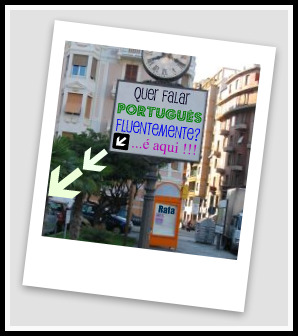Portuguese adverbs are words that allow you to say
what you really want to say.
Olá, tudo bem?!

Today we are going to learn the main Portuguese adverbs. If you learn them, your Portuguese will be clearer and impressive!
But you may be wondering what an adverb is. Or perhaps what is the importance of such a word in a Portuguese phrase.
OK, let me explain.
If you don't now what an adverb is, very quickly I can tell you that it is a word which modifies
2. An adjective and sometimes
To explain the first case, say for instance, you have the phrase
"A Maria lê bem." - "Maria reads well".
The adverb (the word in bold) shows the manner in which Maria's reading is performed. She could read badly, or incorrectly, but the adverb "bem" tells us that the manner she reads is "well" - a good manner.
To explain the second case, for instance , in the examples
"O Manuel é notavelmente inteligente." - "Manuel is remarkably intelligent".
and "A Sofia é muito bonita." - "Sofia is very beautiful.",
Here, the adverb "notavelmente" modifies the adjective "inteligente", and the other adverb "muito" modifies the adjective "bonita" by expressing the degree of intelligence and beauty, respectively.
Get it? Good!
To give you an example for the last case - when an adverb modifies another adverb - say for instance you have the phrase
"A Catarina fala muito depressa." - "Catarina speaks very quickly."
Here we can see that "muito" and "depressa" are two different adverbs, however "depressa" shows the manner Catarina speaks and "muito" expresses the degree of speed of her speech. She could speak not very quickly or even inadequately quickly, but the adverb tells us that she speaks very quickly.
You see? Easy! Wow, I love this!
In Portuguese, adverbs, are varied in their forms and context to express time, place, mode, quantity, intensity, affirmation, denial, doubt and exclusivity. There are also some "adverbial phrases" or, as the grammar call them, "adverbial locutions", which are no more than adverbs but expressed in more than one word, for instance "de vez em quando" - "now and again"
The following tables will give you the most common adverbs divided by the categories aforementioned, with the equivalent English translation for your guidance. So, let's read them carefully!
1. Adverbs that indicate TIME:
| Portuguese | English |
| Hoje | Today |
| Ontem | Yesterday |
| Amanhã | Tomorrow |
| Cedo | Early |
| Tarde | Late |
| Agora | Now
Nowadays |
| Já | Now
Already |
| Já não | Not any more |
| Então | Then
So |
| Logo | Shortly
Immediately
Immediately after
Shortly later |
| Sempre * | Always
All the time
Constantly |
| Nunca | Never
Ever |
| Ainda | Still
Yet |
| Antes | Before |
| Dantes | Formerly
Those times before |
| Antigamente | Formerly
Those times before |
| Primeiro | Firstly
First of all |
| Enfim | Anyway |
* The adverb "sempre" must always follow the verb (e.g. Ela quer sempre bolos" - "She always wants cakes".), because is you place the adverb before the verb (as you do in English), you'll be saying something idiomatically different in Portuguese.
You see, how useful and how important do you think these Portuguese adverbs are for your communication?
Very useful and very important, aren't they?
OK. Let's jump for the next category.
Go to top of the page.
2. Adverbs that indicate PLACE:
| Portuguese | English |
| Aqui | Here |
| Aí | There
Then (Brazilian Portuguese) |
| Alí | Over there |
| Cá | Here |
| Lá | Over there |
| Perto (de) | Near
Next to
Around the corner |
| Longe (de) | Far from |
| Dentro (de) | Inside |
| Fora (de) | Outside |
| Adiante (de) | Ahead |
| Atrás (de) | Behind
At the rear |
| Detrás (de) | Behind |
| Acima | Above |
| Abaixo | Below |
| Debaixo | Under
Underneath |
These are also nice ones, aren't they?
Try to learn these first and then jump to the next ones.
Go to top of the page.
3. Adverbs that indicate MODE or MANNER:
| Portuguese | English |
| Bem | Well |
| Mal | Badly |
| Melhor | Better |
| Pior | Worse |
| Assim | So
This way
Therefore
|
| Depressa | Quicly |
| Devagar | Slowly |
| Como | As
Like
The way like |
| Sobretudo | Above all |
| Principalmente | Mainly |
| Facilmente | Easily |
| Rapidamente | Quickly |
| Efetivamente | Actually |
These ones are very useful ones, don't you think?
Many Portuguese adverbs end in "...mente" - whilst in English end in "...ly", e.g. "fluentemente" - "fluently".
Portuguese adverbs ending in "...mente" are formed from the feminine form of common adjectives, e.g. the adjective "rápido" (quick) in its feminine form is "rárida", so the correspondent Portuguese adverb is "rapidamente" (quickly).
Here is a challenge: How many adverbs ending in "...mente" can you make up from English words?
Have you found some? Write a logical text and use them.
In the meantime, if you are still curious about the next category, read on and let's find together the Portuguese adverbs that indicate quantity or intensity.
Go to top of the page.
4. Adverbs that indicate QUANTITY OR INTENSITY:
| Portuguese | English |
| Muito | Very
Much
Too
Too much |
| Pouco | Little |
| Mais | More
Plus |
| Menos | Less
Minus |
| Tanto | As much
Too much |
| Tão (de) | So much |
| Quanto (de) | As much |
| Quase (de) | Almost |
| Bastante | A lot
Too much
Enough |
| Demsiado (de) | Too much |
Have you noticed, that in English you need more adverbs than in Portuguese to express yourself? With the same Portuguese adverb you can say things that in English you could not. Interesting hein...
Go to top of the page.
5. Adverbs that indicate AFFIRMATION:
| Portuguese | English |
| Sim | Yes |
| Certamente | Certainly
For sure |
| Decerto | certainly |
| Realmente | Really |
These Portuguese adverbs are quite easy to guess or even to remember, aren't they?
Go to top of the page.
6. Adverbs that indicate DENIAL:
| Portuguese | English |
| Não | No
Don't |
| Nunca | Never
Ever |
| Nem | Neither
Nor |
| Jamais | Never ever |
Go to top of the page.
7. Adverbs that indicate DOUBT:
| Portuguese | English |
| Talvez | Maybe
Perhaps
May |
| Se calhar | Maybe
Perhaps
May |
| Provavelmente | Probably |
These are not too many. Actually, when we speak we talk more about real facts than doubting about situations. ;-)
The next category is...
Go to top of the page.
8. Adverbs that indicate EXCLUSIVITY:
| Portuguese | English |
| Só | Only
Just |
| Somente | Only
Just |
| Unicamente | Only
Just |
| Apenas | Only
Just |
| Senão | Otherwise |
In this category of Portuguese adverbs we have indeed many ways to say the same thing.
OK. We almost at the end! Ooff! Ok, the last category is...
Go to top of the page.
9. ADVERBIAL PHRASES OR LOCUTIONS:
| Portuguese | English |
| Às escuras | In the dark |
| Às direitas | Right
Well |
| ÀS vezes | Sometimes |
| Ao acaso | Randomly |
| Em breve | Soon
Shorly |
| Em vão | In vain |
| À toa | Crazily |
| Por acaso | By chance |
| De baixo | Under |
| De lado | Beside |
| A sós | Alone |
| Com efeito | Effectively |
| De novo | Again
One more time |
| Em resumo | In conclusion |
| De vez em quando | From time to time
Now and then
Once in a blue moon |
| A cada passo | Often |
| Por alto | Roughly |
| À vontade | Comfortably |
| Com certeza | Surely
Certainty |
Como deve ser | Properly | De facto (PT)
De fato (BR) | Actually | Actualmente | Nowadays |
And this is it. Now you know what you have to do, right?
You got it! You have to write down sentences and stories using these words!
Até amanhã (See you tomorrow).
Rafa :-)
Go to top of the page.
Go Back From Portuguese Adverbs To Portuguese Grammar.
Go Back To Home Page.
Have you enjoyed this page? Want to link back? Here's how...
Would you prefer to share this page with others by linking to it?
- Click on the HTML link code below.
- Copy and paste it, adding a note of your own, into your blog, a Web page, forums, a blog comment,
your Facebook account, or anywhere that someone would find this page valuable.






